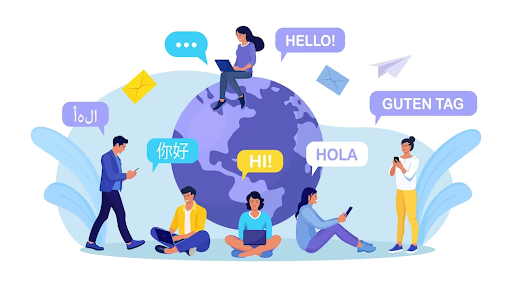Why a Multilingual Website is Important for Your Business

In today’s globalized world, businesses must adapt to changing market conditions and customer demands. One way to do this is by having a multilingual website catering to customers who speak different languages. A multilingual website can provide businesses with several benefits, including increased reach, improved customer experience, enhanced credibility, competitive advantage, advanced SEO, and improved brand image.
In this blog, we’ll explore these benefits in detail and provide real-time data references to showcase the importance of having a multilingual website for business success.
Increased Reach: Reaching a Wider Audience

One of the main benefits of having a multilingual website is that it can help businesses reach a wider audience. By providing content in multiple languages, companies can attract customers who may not speak their website’s primary language. For example, if your website is in English, you may miss out on potential customers who speak Spanish, Chinese, or other languages.
Real-time data shows that businesses that offer their website using multiple language translation services can increase their reach significantly. A Common Sense Advisory study found that 72.4 percent of consumers are more likely to purchase a product if the information is available in their native tongue, and 56.2 percent of consumers rated the capacity to obtain information in their native tongue as being more important than price. Furthermore, a survey by CSA Research found that 40% of online shoppers will not buy from websites only available in English.
Improved Customer Experience: Making it Easier for Customers to Browse and Shop
Another benefit of having a multilingual website is that it can improve the customer experience. By providing content in their native language, customers can more easily understand your products and services, leading to higher engagement and sales.
Real-time data supports providing content in multiple languages to improve the customer experience. A survey by CSA Research found that 55% of consumers only buy products from websites that provide information in their language. Furthermore, 74% of consumers said they were more likely to return to a website if it was available in their language.
Enhanced Credibility: Giving Your Business a Professional Image

Having a multilingual website can bolster your business’s credibility and lend it a more professional image, particularly if you operate in a global market. By offering content in multiple languages, you demonstrate to your customers that you are committed to addressing their needs and place a premium on inclusivity and diversity.
Current data attests to the impact of multilingual websites on enhancing a business’s reputation and credibility. As per a survey by Eurobarometer, 90% of Europeans state that they are likelier to engage with a website that is available in their native language.
Competitive Advantage: Standing Out in a Crowded Market.
In today’s global marketplace, businesses face stiff competition from local and international players. A multilingual website can help your business stand out in a crowded market by offering language support your competitors may not provide.
Real-time data supports the idea that a multilingual website can provide a competitive advantage. According to a survey by CSA Research, 75% of consumers prefer to buy products in their own language, and 60% of consumers said they rarely or never buy from English-only websites. By offering your website in multiple languages, you can attract these customers and gain a competitive edge over your competitors.
Increased SEO: Making it Easier for Customers to Find You Online

Having a multilingual website can also improve your search engine optimization (SEO) and make it easier for customers to find you online. By offering content in multiple languages, you can target specific keywords and improve your visibility in search engine results pages (SERPs).
Real-time data shows that a multilingual website can improve your SEO and drive more traffic to your website. According to a study by SEMrush, websites with multilingual content have 47% more traffic than websites that only offer content in one language. Furthermore, a survey by Common Sense Advisory found that 72.1% of consumers spend most or all of their time on websites in their own language, indicating that providing content in multiple languages can lead to longer engagement times and increased traffic.
Improved Brand Image: Demonstrating Your Business’s Values
Finally, having a multilingual website can improve your brand image and demonstrate your business’s values. By offering language support, you show your customers that you value diversity and inclusivity, which can improve your reputation and attract new customers.
Real-time data supports the idea that a multilingual website can improve your brand image. According to a survey by CSA Research, 40% of global shoppers will not buy from a website that is not available in their language, and 55% of consumers only buy products from websites that provide information in their own language. By offering your website in multiple languages, you can attract these customers and demonstrate your business’s commitment to inclusivity and diversity.
Real-time Data References: The Importance of Multilingual Websites for Business Success
To further illustrate the importance of multilingual websites for business success, here are some additional real-time data references:
According to a study by CSA Research, the global market for outsourced language services and technology will reach $56.18 billion by 2021.
The same study found that businesses that localize their content for different markets can expect a 100-200% increase in revenue.
A survey by CSA Research found that 54% of global consumers prefer to use their native language when shopping online.
The same survey found that 46% of consumers said that the ability to read reviews in their own language was more important than price.
According to a survey by Eurobarometer, 90% of Europeans say that they are more likely to use a website that is in their language.
A study by Nimdzi Insights found that businesses that localize their website content can expect a 30% increase in traffic and a 40% increase in engagement.
Conclusion: The Bottom Line on Multilingual Websites for Business Success
In today’s globalized world, having a multilingual website is essential for businesses that want to succeed and thrive. A multilingual website can provide businesses with a number of benefits, including increased reach, improved customer experience, enhanced credibility, competitive advantage, increased SEO, and improved brand image.
Real-time data supports the importance of having a multilingual website, as it can lead to increased revenue, higher engagement, and improved customer satisfaction. With the right language support, businesses can connect with customers from all over the world and establish themselves as global players in their respective industries.
So, if you’re looking to expand your business and reach a wider audience, consider investing in a multilingual website. By providing language support, you can improve your customer experience, enhance your brand image, and gain a competitive advantage over your competitors. With the right strategy and approach, a multilingual website can be a powerful tool for business success in today’s global marketplace.



